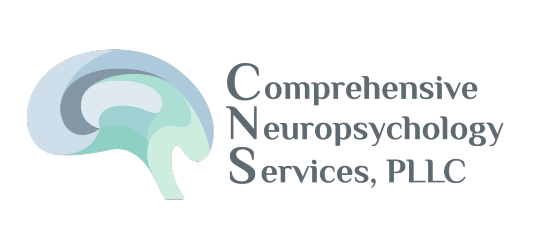When a child faces academic challenges, navigating the landscape of assessments can be perplexing for parents and educators alike. The terms “psychoeducational testing” and “neuropsychological testing” are often thrown around interchangeably, leading to confusion about their distinctive features.
At Comprehensive Neuropsychology Services (CNS), we aim to shed light on their differences while highlighting areas in which they overlap.
| Aspect | Psychoeducational Assessment | Neuropsychological Evaluation |
| Purpose | Assess academic and learning abilities, primarily to determine eligibility for special education services | Evaluate cognitive, academic, emotional, social, and behavioral functioning to understand a child as a whole and guide recommendations |
| Focus | Educational and learning-related concerns with some assessment of behavior and social functioning | Broad-based, including thinking, learning, and academic abilities as well as mood, behavioral, social, and personality domains |
| Setting | Conducted within an educational setting (school) | Typically conducted in a clinical or hospital setting |
| Evaluator and Training | School psychologist with a minimum of a master’s degree (2020 survey showed 22% had doctoral degrees) | Clinical neuropsychologist with a doctoral degree and often two years of post-doctoral training in neuropsychology |
| Referral Source | Often initiated by teachers, parents, or school staff | Educators and parents refer, but often physicians, psychologists, or other healthcare professionals also refer |
| Scope of Assessment | Primarily focused on understanding and accommodating academic difficulties, learning disabilities, and behavioral issues | Comprehensive. Aims to understand and guide decisions about improving aspects of overall reasoning, memory, attention, language, executive functions, academics, emotional and social well-being, and health-related factors |
| Diagnosis | Cannot provide a diagnosis, including for learning disorder, ADHD, or autism | Results include appropriate clinical diagnoses related to attention, learning, behavior, development, or mood. |
| Tools Used | Standardized tests of IQ and academic achievement as well as behavioral assessments | Extensive neuropsychological test battery (including IQ and academics), interviews, and input from educators, physicians, and other healthcare professionals |
| Collaboration | Collaboration with teachers, parents, and school staff | In addition to parents and teachers, collaborate with healthcare professionals, such as pediatricians, neurologists, therapists, and psychiatrists |
| Time Frame | Schools have 90 days to complete evaluation; often completed over several days | Wait times for first appointment can vary from days to months; testing is completed over one to several sessions. |
| Report Emphasis | Emphasizes educational service eligibility, implications for learning, and recommendations | Provides personalized interventions tailored to the individual’s cognitive, educational, and neuropsychological functioning |
| Interventions | Recommendations for educational accommodations and support | May include recommendations for school, medical, therapeutic, or rehabilitative interventions, and strategies for home and family |
| Population | Primarily school-aged children and adolescents | Individuals of all ages, from infants/toddlers to older adults |
| Insurance Coverage | Often covered by educational institutions and public school districts | May or may not be covered by health insurance depending on the specific nature of the evaluation; some providers are private pay only |
When your child faces challenges at school, you want answers fast, and you want a clear path to support and well-being. At Comprehensive Neuropsychology Services (CNS), we understand the urgency. We’re here to demystify the difference between psychoeducational testing and neuropsychological testing, empowering families to navigate assessments effectively.
While both evaluations share common benefits, it’s the subtle distinctions that matter. From the focused lens of psychoeducational assessments to the comprehensive approach of neuropsychological evaluations, our goal is to guide individuals, parents, and educators toward a complete understanding. We offer guidance around personalized interventions, tailored to each person’s unique cognitive, educational, and neuropsychological needs. Join us at CNS, where expertise meets compassionate guidance on the journey to optimal well-being.










